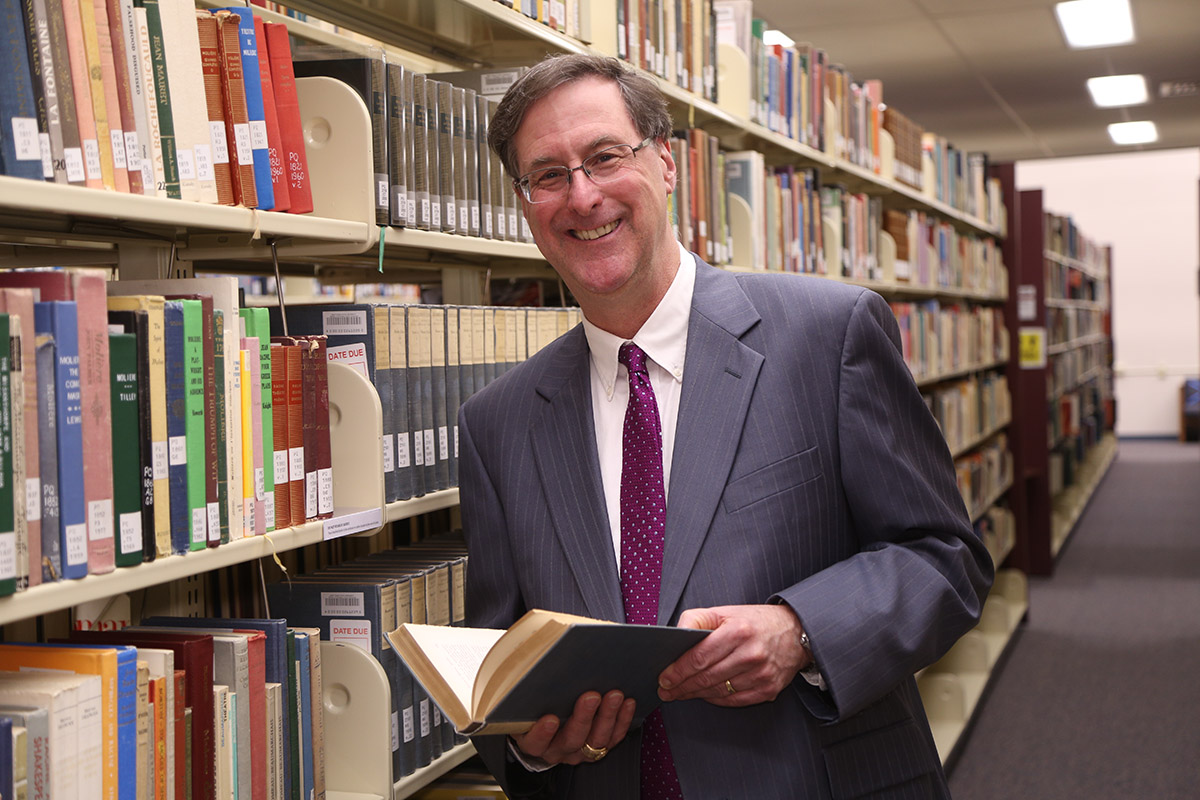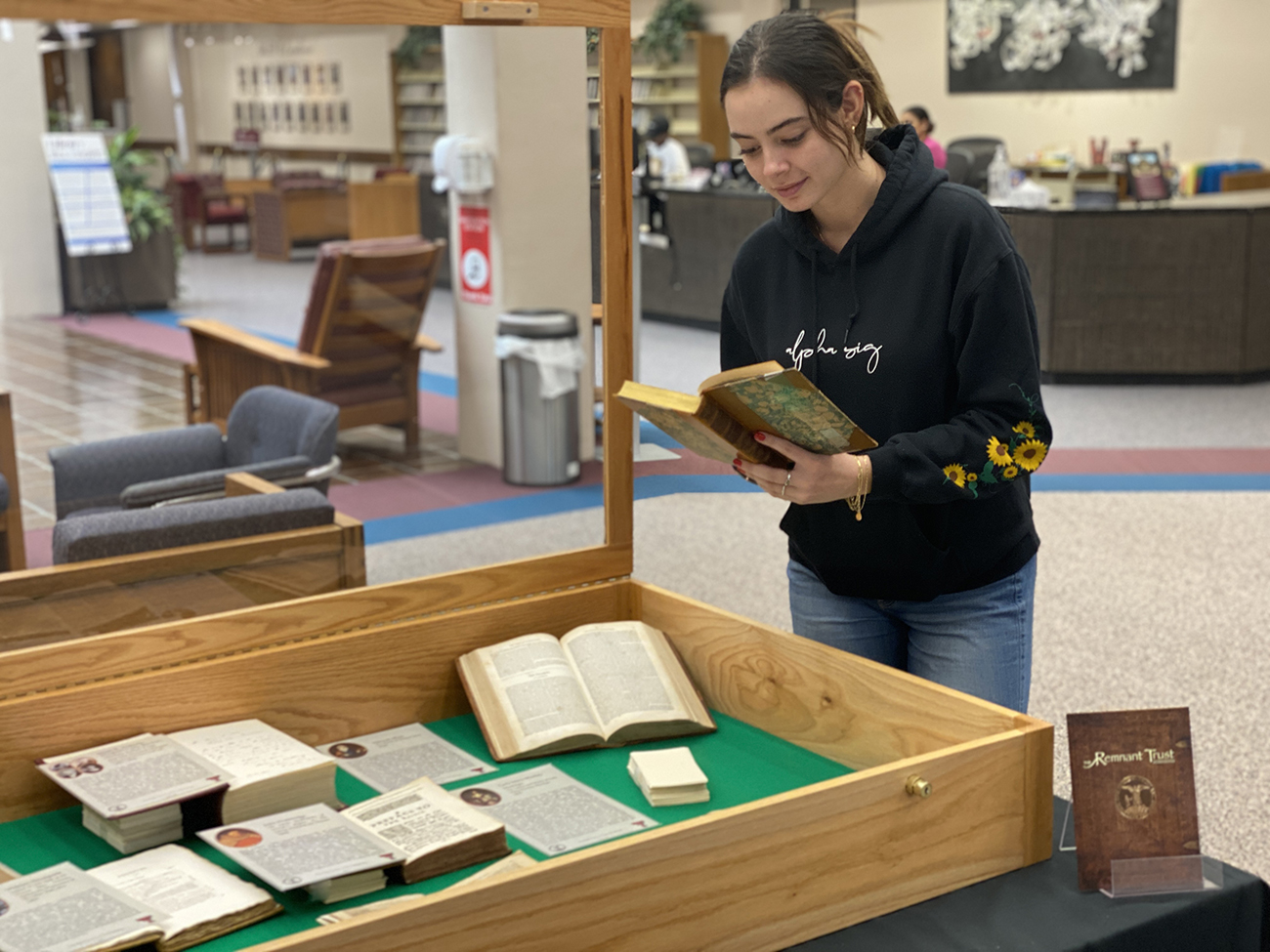- Arts
- Jon Mark Beilue
- Cornette Library
- Community
- History
- Featured
Jon Mark Beilue: Long-ago rebels with a cause
Remnant Trust event shows works of freedom from the past
To look at the words now is to turn back the centuries to a time when the tectonic plates of change were slowly shifting, to a crossroads in history where the paths began to forever change in another direction, where courage was intertwined with hope.
“All of them were rebels in their own way,” said Dr. Bruce Brasington, the Twanna Caddell Powell Professor of History at West Texas A&M University. “They did not conform to the way the world wanted them to be.”
They were pioneer leaders of movements. They were the early conscience of thousands. They were also authors — 16 of whom, in this case, are featured through the Remnant Trust, a collection of first-edition works spanning centuries on loan this past month to WT.
The Remnant Trust is an educational foundation housed at Texas Tech University that is a collection of manuscripts, first editions and early works on individual liberty and human dignity that date as far back as 1250.
This is the sixth time WT has had Remnant Trust manuscripts on campus since 2010 and the first since 2017. This collection, on loan to WT since Sept. 28, was funded by Jim and Barbara Whitten under the auspices of the Sybil B. Harrington College of Fine Arts and Humanities and overseen by the Department of History.
The works have been available for viewing at the Cornette Library and the Panhandle-Plains Historical Museum. The exhibition culminates at 7 p.m. Oct. 28 with an event open to the public at Legacy Hall at the Jack B. Kelley Student Center.
The 40-minute presentation will have eight professors and graduate students speak for five minutes each on a specific manuscript, including English poet John Milton’s “Areopagitica,” written in 1644 to oppose censorship; to women’s suffrage leader Susan B. Anthony’s three volumes on the early history of women’s suffrage movement, completed in 1922; to Frederic Douglas’ autobiography in 1893 describing his experiences during and after the Civil War.
Graduate students will be at tables with the documents to discuss their meaning and provide insight after the program, which is free. The works can be held and be photographed.
The complete Remnant Trust collections include works in philosophy, politics, religion, math and science and economics. The theme of this collection of mostly first editions is freedom.
 Photo:Dr. Bruce Brasington will lead an Oct. 8 roundtable discussion on books from the Remnant Trust.
Photo:Dr. Bruce Brasington will lead an Oct. 8 roundtable discussion on books from the Remnant Trust.“I think about that quite a bit,” Brasington said. “The University exists because of freedom. So these volumes from men and women who lived well in the past are witnesses to the heritage of freedom and also to the sacrifice to achieve that freedom.
“I know I take that for granted all too often. So when these works come and colleagues speak about them and the public is able to hold them in their hands, they’re not holding a thing, a very expensive thing. They’re holding an idea and a struggle. They’re holding works of a people who said freedom and dignity belong to all people.”
Seven authors were women writing on the rights of women. Judith Sargent Murray with two articles in Massachusetts Magazine and Mary Wollstonecraft with her piece “A Vindication of the Rights of Women” were some of the earliest feminist writings from the 1790s. Wollstonecraft attacked the double standard of education among the men and women of the time and the idea that women should receive only a domestic education.
William Thompson, an Irish poet, was one of the first men to publicly support women’s rights. In 1825, he published a rebuttal to a piece that dismissed women’s political rights and that only men should vote as the sole representative of a family.
Elizabeth Cody Stanton’s 1854 address to the New York legislature on the legal difficulties women faced is in the Remnant Trust. Ironically, Stanton was not permitted to deliver the address in person. That job fell to a man.
Dr. Brian Ingrassia, associate professor of history, will summarize the voluminous work of Mercy Warren, who penned a 1,200-page, three-volume piece in 1805 – “History of the Rise, Progress and Termination of the American Revolution.”
Warren was a former Federalist, an early party of power at the time of the Revolution committed to a fiscally sound and nationalistic government. Warren was friends with Washington, Jefferson and Adams. Her writings cost her friendship with Adams.
“She was an anti-Federalist at the time of the Constitutional Convention. She did not like the Constitution very much,” Ingrassia said. “She saw the Revolution as this incredible potential for a sense of liberty and freedom for Americans, but was not happy with what happened afterward.
“She saw it as a group of very powerful men who dampened down some of that potential. Warren is a woman writing about governance, and not writing as a woman, but certainly a woman who wanted a greater voice in what governance should be.”
Perhaps no one paid a higher price for their written works than Algernon Sidney. The Englishmen was executed in 1683 for treason against the English monarchy after writing, though not publishing, “Discourse Concerning Government.”
Sydney had written that absolute monarchy was a political evil, that individuals had the right to govern themselves. Sydney was accused of plotting against Charles II and executed. His work was ultimately published in 1698.
William Penn’s 1670 work “The Great Case of Liberty Conscience” also is featured in the collection. Though an ardent English Quaker, Penn took the stance that religious coercion – forced religious observance – infringed on the liberty of conscience and dishonored God. In a sense he was an advocate of free will.
Two pieces advocate for freedom of speech and press and decry censorship. Milton’s “Areopagitica” from 377 years ago opposes censorship and states that a writer should not be silenced by others.
The pleading and arguments in the 1735 trial of New York printer John Peter Zenger, compiled by James Alexander and published in 1752, is a factual account of the landmark trial that acquitted Zenger of libel against the New York governor. It was the first major victory for freedom of the press and a forerunner to the second amendment of the Constitution.
“Every single one of these people,” Brasington said, “refused to be held down by their society. They stood for freedom and the dignity of individuals. Not only is there the sheer brilliance of their writings and words, but they were rebels. We come from a country born from rebellion.”
Do you know of a student, faculty member, project, event, alumnus or any other story idea for “WT: Heart and Soul of the Texas Panhandle?” If so, email Jon Mark Beilue at jbeilue@wtamu.edu.
Top photo: Vanessa Hayes, a senior finance major from Santa Cruz, Bolivia, examines one of the texts in this year's Remnant Trust exhibition at Cornette Library.

